 This was Bipolar India’s milestone 10th year of World Bipolar Day National Conferences in Mumbai!
This was Bipolar India’s milestone 10th year of World Bipolar Day National Conferences in Mumbai!
And this time too, it was a coming together of people with lived experience, family caregivers and those from the psychology background, all keen to learn and absorb all the knowledge and insights shared.
Saturday, 29th of March, 2025 saw the participation of over a hundred from Mumbai and outside the state too, gathered to soak in all the experience and knowledge sharing. This full day Conference was hosted by Bipolar India, an initiative of Mental Health Support Foundation, in collaboration with Amaha. Incidentally, this was the 3rd year in a row of these collaborative offerings.
Participants came in at 9 am and engaged in conversations over breakfast.
The day began on a solemn note, with Bipolar India Founder Vijay Nallawala requesting the audience to stand in silence for a minute to commemorate the passing away of a peer.
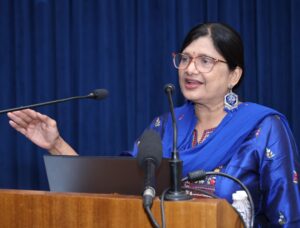 Dr Anjali Gokarn, then began the proceedings with a Welcome Address and brief overview of what MHSF was all about.
Dr Anjali Gokarn, then began the proceedings with a Welcome Address and brief overview of what MHSF was all about.
Dr Anjali Gokarn, MBBS, MD, is a Pediatrician by Profession for the last 36 years. She has been living with Anxiety and Depression for four decades. She also has lived in a family with high prevalence of Mental illnesses. Anjali is on Advisory Board, to Mental Health Support Foundation and now also on its recently constituted Operations Team.
(Full Bio of each Speaker in our Event Announcement post.)
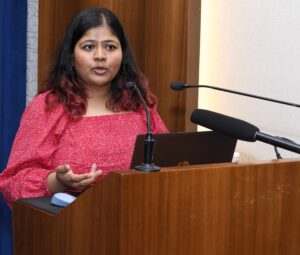 ‘Young & Thriving’ was the presentation by, very aptly, a youthful voice from our community, Avantika Bharad. Avantika, a passionate social entrepreneur and mental health advocate is dedicated to building safe spaces where people can pause, learn, heal and thrive. She has a background in psychology.
‘Young & Thriving’ was the presentation by, very aptly, a youthful voice from our community, Avantika Bharad. Avantika, a passionate social entrepreneur and mental health advocate is dedicated to building safe spaces where people can pause, learn, heal and thrive. She has a background in psychology.
Avantika shared the challenging journey of living with Bipolar Disorder, coming to terms with the condition while also pursuing her degree in Psychology and the insights that she gained from the process. She spoke about challenges with acceptance, the impact of a dysfunctional family and how she navigates her way around these. Her self-awareness and insight into her condition helps her manage it better. At just twenty two, she is quite an achiever! Her inspiring story instils belief in other youngsters that a mental disorder does not mean an end to one’s aspirations.
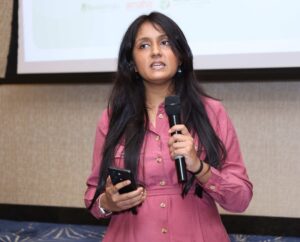 Nandita Sugandhi, then took stage to share her experiential insights on the theme, ‘Bipolar Disorder and Career Success’
Nandita Sugandhi, then took stage to share her experiential insights on the theme, ‘Bipolar Disorder and Career Success’
In a heartfelt talk, Nandita talked about the travails of living with Bipolar Disorder and simultaneously balancing the pulls on her time and energy on dual fronts: her job in a position of responsibility and her continuing academic pursuits. She began by tracing the early onset mental health challenges that affected her while at school and how these impacted her academics. It is remarkable that despite these series of MH related setbacks she did not cast aside her higher education aspirations and in fact, has stellar educational qualifications. Her authentic sharing of the ups and downs that she faced along the way, in her academic, personal and work related life resonated deeply with the audience. It is so difficult to share vulnerabilities that one might be hesitant to, in public domain. Nandita did not hold back and talked about how she struggled in coping with the episodes of severe bipolar depression, inability to get out of bed, resorting to alcohol abuse at times. She has confided about her mental health condition to her bosses at Mondelez.
Nandita is working as E2E Productivity Lead for the India Business for Mondelez International (previously Cadbury). She holds a M. Mgmt. and an Executive MBA and is also a Civil Engineer. It is a tribute to her passion and commitment that Nandita also contributes to the work at MHSF by being on Core Team of the livelihoods initiative, Let’s Walk Together. She’s also part of the Operations Team, MHSF.
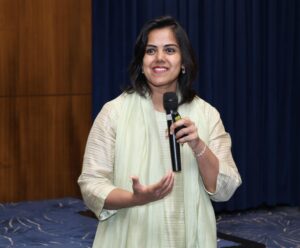 We had an incredibly inspiring speaker in the high achiever, Neha Kirpal, Co-Founder, Amaha Health, Founding Cohort, India Mental Health Alliance (IMHA), Aspen Fellow, Eisenhower Fellow & Young Global Leader (WEF).
We had an incredibly inspiring speaker in the high achiever, Neha Kirpal, Co-Founder, Amaha Health, Founding Cohort, India Mental Health Alliance (IMHA), Aspen Fellow, Eisenhower Fellow & Young Global Leader (WEF).
‘Centering the Expertise by Experience’ was the theme of her talk, as she shared her deeply moving personal journey of being caregiver on dual fronts, the intensely challenging circumstances that she endured and also her own mental health struggles. Why is Neha’s journey so awe inspiring?
Her role as a caregiver, witness to intense turmoil, her own mental health struggles and somehow managing to maintain her poise amid the raging storms is remarkable. More importantly, rather than collapsing under the weight of what life had dealt her, she has embarked on an ambitious journey to fill the gaps in mental health care that her family faced. Amaha, Co-Founded by Dr Amit Malik and Neha is the largest Indian startup in the mental health care space. Moreover, Neha is Founding Cohort of IMHA that aims to be an umbrella organisation and catalyst for all NGOs in the domains of mental health and intersectional fields.
Her personal journey did not merely stop at her coming to terms with the odds but has made her passionately wanting to contribute to and help transform the mental health care landscape of the country.
We at MHSF are grateful to Neha for her and Amaha’s unstinted support to these Conferences over the past three years.
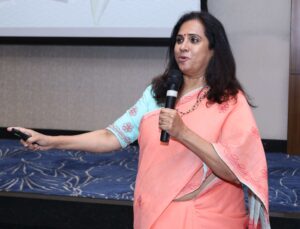 As a parent Caregiver, the distress one faces is on manifold grounds. Feeling guilty, helpless, inadequate, overwhelmed and ignoring one’s own needs are common concerns. Saraswathi Suresh’s sharing covered many of these aspects in her journey of supporting her son who lives with Schizophrenia.
As a parent Caregiver, the distress one faces is on manifold grounds. Feeling guilty, helpless, inadequate, overwhelmed and ignoring one’s own needs are common concerns. Saraswathi Suresh’s sharing covered many of these aspects in her journey of supporting her son who lives with Schizophrenia.
‘Compassionate Caring to Advocacy’ was the topic she addressed.
Her heartfelt sharing struck a chord with many of the family caregivers in the audience. She shared the gamut of emotions through this long struggle… of recrimination, of feeling lost to evolving to be a better carer. One of the admirable parts about her story is how she has held herself together, with the help of a supportive spouse and ensured her life has a balance. Self-time is something that she deeply values and cherishes her weekend getaways and trips with friends. Her own journey as Caregiver inspired Saraswathi to cofound FAVMI, an NGO that advocates for implementation of various policies and acts.
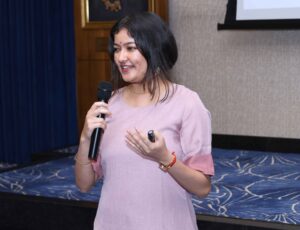 We at MHSF have a very strong focus on evidence based multi-disciplinary approach to recovery. Dr Raksha Bhide, Clinical Yoga Therapist, who came in from Bengaluru, began by elaborating on what yoga actually comprised of, not just limited to the physical form of it which is as per popular perception of it.
We at MHSF have a very strong focus on evidence based multi-disciplinary approach to recovery. Dr Raksha Bhide, Clinical Yoga Therapist, who came in from Bengaluru, began by elaborating on what yoga actually comprised of, not just limited to the physical form of it which is as per popular perception of it.
She spoke about breathwork. About intricate bond between breath, body and mind, the linkage of breath and our feelings, how slowing our breath contributes to calming our minds. Her engaging talk in very simple language, punctuated by demonstrations of practices, could help the audience relate with it. After her brief presentation, she invited all the participants to join her in trying out simple practices such as simple to do stretching exercises and a few pranayam practices such as Anulom Vilom & Bhramari. She encouraged the audiences to notice how they felt after these practices.
Dr Raksha Bhide holds a PhD in Clinical Yoga Therapy and Mental Health from Dept of Psychiatry, NIMHANS. Of course, the practices demonstrated by Raksha at the Conference do not lend so well in this summary of her talk. Videos of her session as well as those of others will be uploaded on our YouTube channel soon.
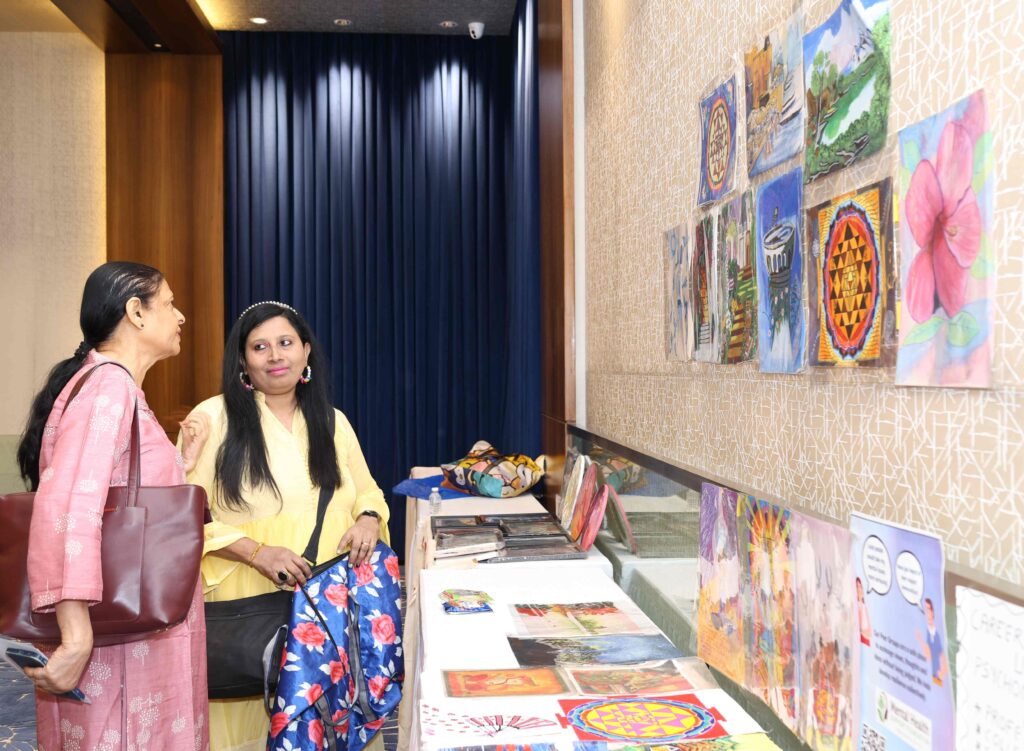 Amidst all this there was lively interaction over breakfast, lunch and the high tea breaks. Art work by our community embellished a section dedicated for display and sale.
Amidst all this there was lively interaction over breakfast, lunch and the high tea breaks. Art work by our community embellished a section dedicated for display and sale.
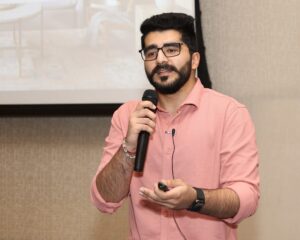 Anshul Khosla, a licensed clinical psychologist with over 4.5 years of experience, took up the topic, Expectations from Psychotherapy in Bipolar Disorder
Anshul Khosla, a licensed clinical psychologist with over 4.5 years of experience, took up the topic, Expectations from Psychotherapy in Bipolar Disorder
He emphasised that while there are chemical imbalances which the medicines help treat, psychotherapy helps us understand ourselves better and manage the psychosocial aspects of an illness. Anshul spoke about cognitive distortions and maladaptive thoughts that can be changed with support of therapy, helping the person have a more balanced perspective. To begin with, it is important to choose the right professional, ensuring the Therapist has the right credentials and has worked with such clients before. Also, whether the therapist is adept at various types of therapies such as CBT, IPSRT, DBT, etc, ensuring that the fit is right. (These therapies are useful in treating bipolar disorder). It is alright to seek psychoeducation about one’s diagnosed disorder.
He then elaborated more on the role of psychotherapy in bipolar disorder, i.e., stabilising mood, improving mood regulation, enhancing coping skills and fostering self awareness.
Anshul later elaborated upon the types of therapy viz, CBT, IPSRT and DBT and how exactly they helped a person with bipolar disorder manage the condition better.
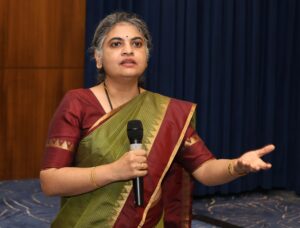 Our community has so many unanswered queries, doubts and concerns around managing Bipolar Disorder.
Our community has so many unanswered queries, doubts and concerns around managing Bipolar Disorder.
Dr Vani Kulhalli, Psychiatrist, dived into the very relevant topic of ‘What We Know About Bipolar Disorder’
She dispensed of using a PowerPoint presentation so that she interacted with the audience more directly. Her talk encompassed diverse sub themes such as epigenetics, the balance between need for treatment and when it can be withdrawn, the issues around physical comorbidities. Persons with bipolar disorder are more prone to Hyper Tension, obesity and cardio-vascular disease. Her dwelling on epigenetics captured the attention of our audience the most because it was new to many of them. Thus, the fascinating aspects of gene expression, the ‘nature vs nurture’ aspect and how it can affect the progression of a mental disorder. Adverse environmental factors can worsen course of disorders and lifestyle modification or a healthy lifestyle can even help reverse it. She also shared anecdotes of client’s experiences and their concerns and approaches. All in all, a talk by Dr Vani Kulhalli that helped deepen the knowledge about bipolar disorder and was highly appreciated by the eager to learn participants.
Dr Vani Kulhalli earned MD Psychiatry from NIMHANS Bangalore and is working in Mumbai since 2003
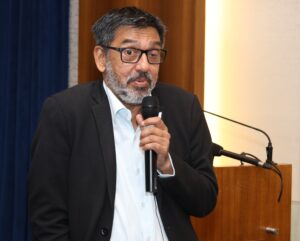 It was then the turn of the Keynote, ‘A Rights Based Approach to Mental Health’
It was then the turn of the Keynote, ‘A Rights Based Approach to Mental Health’
Although he is an authority on various Acts and Laws of the land that empower persons living with Mental Health conditions, Dr Soumitra Pathare, Director, Centre for Mental Health, Law & Policy and a Psychiatrist, chose to dwell on basic human rights. Dr Pathare is also on Advisory Board to us at Mental Health Support Foundation.
That the same human rights that are available to any individual need to be also available to a person living with a mental disorder. A rights based approach emanates from this simple premise. When we talk about Rights, we generally talk about those at State level or provided under the various laws, he said. However, we often see rights being abused or subverted at family level, he asserted.
Family caregivers provide a safety net for person they are caring for. However out of our love and need to protect, are we pulling the safety net so tightly in that it suffocates the person, is no longer a safety net but is now a cage? It is important to ensure that any behaviour or action of the person that leads to catastrophic consequences be safeguarded against. However, that does not mean the person’s freedom is stripped and every action of his or hers scrutinised and found fault with.
He said that the fact is that people who are so called ‘normal’ also mess up, some with serious consequences. The moment a person with disability messes up, every action and behaviour is then open to scrutiny. If the benchmark for people as a whole is X, that for a person with disability is raised to 3 X. The person has to prove his capabilities at each juncture, over and over again. Thus, he appealed to the family carers in the audience to reflect on this aspect, to balance their protective instincts with the need of the person for freedom.
He exhorted the audience to expand their perspective of rights. To join hands with all other forms of marginalised segments of society in their fight for rights.
Nobody is free until everybody is free.
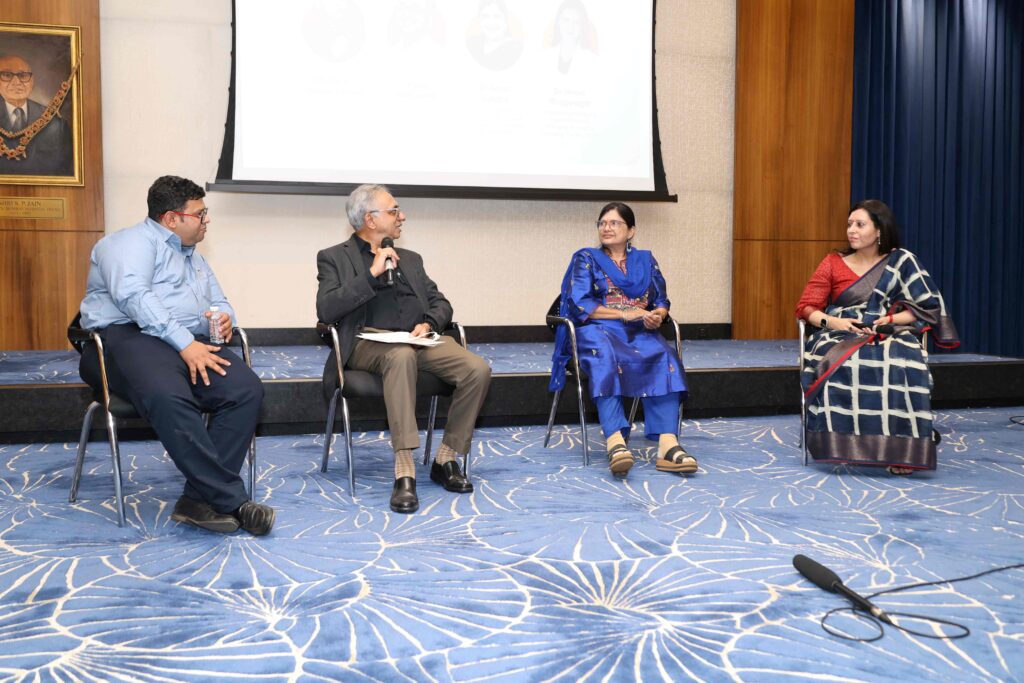
L to R: Dr Milan B, Vijay N, Dr Anjali G, Dr Hvovi B
After the rousing and though provoking Keynote, it was the turn of the Panel Discussion
Dr Anjali Gokarn, brought in perspectives from her lived experience with depression and anxiety disorder and as caregiver. (Her Bio can be accessed right at the top of this post)
The panel was rounded off with mental health professionals in:
Dr Hvovi Bhagwagar, Clinical Psychologist and Psychotherapist and the founder of Manashni, a private practice in Mumbai. Now in the 25th year of her career, she works extensively with mental health challenges, including mood disorders, anxiety, and trauma-related conditions and is Founding Trustee with us at MHSF
Dr Milan Balakrishnan, Licensed Psychiatrist with over 15 years of experience in the field of mental health. A Consultant Psychiatrist at Bombay Hospital, Dr Milan is trained in both general psychiatry, child and adolescent psychiatry and in psychotherapy. He is Founding Trustee of Mental Health Support Foundation.
This highly capable Panel was moderated by Vijay Nallawala, Author, Founder, Bipolar India and Managing Trustee, Mental Health Support Foundation. He has multi decade lived experience with Bipolar Disorder, OCD and ADHD.
Anjali shared how she managed to juggle with multiple responsibilities, her professional practice, her own mental health issues and caregiver to her son. She said that she had learnt one thing through the years. That there was no point in fighting with depression but one has to ‘sit with it’ when affected. She also has an emphasis on a holistic health approach, about her being a fitness enthusiast that helped her with her mental health too. Her discipline has thus stood her in good stead.
Dr Milan spoke about how no two persons with Bipolar Disorder would have identical issues, their environments too would vary widely. It was important to continue being in treatment, even if results are not immediately forthcoming. Over a period of time, a meaningful recovery was a high possibility, as demonstrated by so many from the Peer community of Bipolar India.
Hvovi was asked about the unique theme of her Doctoral research, Secondary Trauma among Therapists. She talked about a fine opportunity recently of presenting a paper on this at a Conference in Boston. Her research was inspired partly by the pandemic and resultant stress that therapists encountered. She also spoke about her personal challenges as a Therapist and those of her peers.
Anjali shed light on her being a physician and whether that was in any way an obstacle in her seeking treatment or questioning the process. She shared that the biggest advantage she had was a fantastic Psychiatrist right from the beginning. That helped build trust in the treatment. She also resorted to Therapy to understand her own thought patterns and mend them.
Hvovi, when asked about unhealed trauma and impact on one’s mental health, shared very useful insights. She said that if some persons despite years of being in treatment do not experience satisfactory outcomes, unhealed trauma could be a barrier. She implored the participants to consider addressing their trauma if feeling stuck endlessly. ACE or Adverse Childhood Experiences and their fallout on mental health was being acknowledged more and more.
Dr Milan was asked about an important aspect that the community often discussed, i.e., persons with serious mental disorders often have chronic physical comorbidities as well. Since concurrent treatment is ingoing for multiple conditions, is it prudent to consult a Psychiatrist or Physician is necessary? He said that in addition to the Psychiatrist, a good physician can be of great help. However, he lamented that the family physician is a rapidly diminishing species, with emphasis on specialisation. By taking due precautions, screenings, risks can be minimised.
The floor was then thrown open to the audience for the Q & A
As usual, the audience had a lot of questions which they wanted the experts to address, which were taken up by our Panelists.
The speakers were presented token of appreciation: the gifts were paintings by community member Artist, Mamta Prasad.
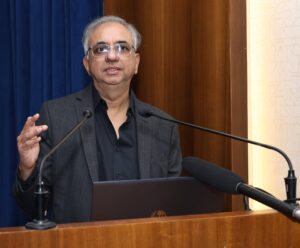 Vijay Nallawala, in his Vote of Thanks, briefly summarised the highpoints of the speakers’ talks and expressed his gratitude to all the people who had made the Conference such a success:
Vijay Nallawala, in his Vote of Thanks, briefly summarised the highpoints of the speakers’ talks and expressed his gratitude to all the people who had made the Conference such a success:
Amaha, including their Team, the volunteers, the speakers and the highly engaged audience. The contribution of the Tech Team at the Auditorium, the photography team and the caterers was also appreciated.
The absolutely riveting day of conversations, stories and knowledge sharing then had to come to a close!
So, until next year…
